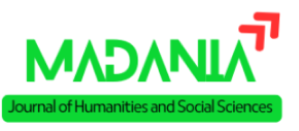Spiritualitas Islam sebagai Faktor Protektif Kesehatan Mental: Tinjauan Interdisipliner dalam Perspektif Pendidikan Agama dan Psikologi Klinis
DOI:
https://doi.org/10.59240/kjsk.v5i2.337Keywords:
Islamic Spirituality, Mental Health, Protective Factor, Religious Education, Clinical PsychologyAbstract
The mental health crisis, marked by rising cases of depression, anxiety, and loss of life meaning among adolescents and university students, requires a holistic and contextual approach. This study aims to analyze the role of Islamic spirituality as a protective factor for mental health through an interdisciplinary review combining Islamic religious education and clinical psychology perspectives. A qualitative literature review method was employed, using hermeneutic content analysis of scholarly works related to spirituality concepts, religious coping mechanisms, and their implementation in educational and psychological interventions. The findings indicate that values such as tawakkul (trust in God), patience, gratitude, and dhikr (remembrance of God) function as positive religious coping strategies that enhance individual resilience against psychosocial stressors. The integration of Islamic spirituality can be realized through the development of religious education curricula, the optimization of teachers’ roles as spiritual mentors, and the application of value-based Islamic psychotherapy. This study concludes that Islamic spirituality holds significant potential as both a preventive and curative intervention in addressing the mental health crisis within Muslim communities.
References
Abu-Raiya, H., & Pargament, K. I. (2011). Empirically based psychology of Islam: Summary and critique of the literature. Mental Health, Religion & Culture, 14(2), 93–115.
Alviasari, A., Fauzi, N. H. P., Aldi, M., Sofa, M. A. N., Nayara, N. S., Nabila, S., & Suresman, E. (2025). Peran Pendidikan Islam dalam Mengatasi Stres karena Tekanan Akademik Mahasiswa di Universitas Pendidikan Indonesia. IHSAN: Jurnal Pendidikan Islam, 3(2), 271–278.
Amram, Y., & Dryer, C. (2008). The integrated spiritual intelligence scale (ISIS): Development and preliminary validation. 116th Annual Conference of the American Psychological Association, 1, 46.
Antonovsky, A. (2002). Unraveling the mystery of health: How people manage stress and stay well. In The health psychology reader (pp. 127–139). SAGE Publications Ltd.
Hans-Georg Gadamer, Truth and Method. London: Continuum
Kemenkes, R. I. (2018). Laporan nasional riskesdas 2018. Jakarta: Kemenkes RI, 154–166.
Keyes, C. L. M. (2002). The mental health continuum: From languishing to flourishing in life. Journal of Health and Social Behavior, 207–222.
Khan, Z. H., & Watson, P. J. (2006). “ Construction of the Pakistani Religious Coping Practices Scale: Correlations With Religious Coping, Religious Orientation, and Reactions to Stress Among Muslim University Students.” The International Journal for the Psychology of Religion, 16(2), 101–112.
Koenig, H. G., King, D., & Carson, V. B. (2012). Handbook of religion and health. Oup Usa.
Krippendorff, Klaus. 2018. Content Analysis: An Introduction to Its Methodology. California: Sage Publications.
Muhammad Rizal, & Amaluddin. (2025). Membangun Generasi Tangguh melalui Pendidikan Agama Islam Berbasis Kecerdasan Spiritual. Journal of Humanities, Social Sciences, and Education, 1(2 SE-Articles), 124–135. https://doi.org/10.91989/6vrykt02
Moleong, Lexy J. 2021. Metodologi Penelitian Kualitatif . Bandung: Remaja Rosdakarya.
Organization, W. H. (2022). World mental health report: Transforming mental health for all. World Health Organization.
Pargament, K. I. (2001). The psychology of religion and coping: Theory, research, practice. Guilford press.
Pearce, M. J., Koenig, H. G., Robins, C. J., Nelson, B., Shaw, S. F., Cohen, H. J., & King, M. B. (2015). Religiously integrated cognitive behavioral therapy: a new method of treatment for major depression in patients with chronic medical illness. Psychotherapy, 52(1), 56.
Permana, M. D., & Afandi, N. K. (n.d.). INTEGRASI NILAI-NILAI AGAMA ISLAM DALAM PENGEMBANGAN PSIKOLOGIS.
Rahmi, E., & Syafyusari, F. (2025). Edukasi Mental Health Dipandang Dari Segi Perspektif Islam pada Penderita Penyakit Kronis. Jurnal Pustaka Mitra (Pusat Akses Kajian Mengabdi Terhadap Masyarakat), 5(1), 14–18. https://doi.org/10.55382/jurnalpustakamitra.v5i1.868
Rena, S. (2018). Spiritualitas dan regulasi diri: Studikoping stres pada mahasiswa Fakultas Kedokteran di DKI Jakarta.
Septyningtyas, D. J., Purwaningsih, E., Purwitasari, E. P., Thein, P. S. Y., & Tarigan, E. S. A. F. (2025). Konseling Islam: Pendekatan Spiritual Untuk Mengatasi Masalah Psiko-Sosial. Star Digital Publishing, Yogyakarta-Indonesia.
Snyder, C. R., Irving, L. M., & Anderson, J. R. (1991). Hope and health. Handbook of Social and Clinical Psychology: The Health Perspective, 162(1), 285–305.
WHO. (2021). Mental Health Action Plan 2013-2030. https://www.who.int/publications/i/item/9789240031029%0A%0A
Downloads
Published
How to Cite
Issue
Section
License
Copyright (c) 2025 Zwesty Kendah Asih, Arief Sukino, Fitri Sukmawati

This work is licensed under a Creative Commons Attribution-NonCommercial-ShareAlike 4.0 International License.






